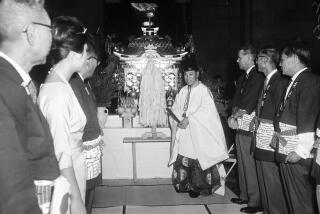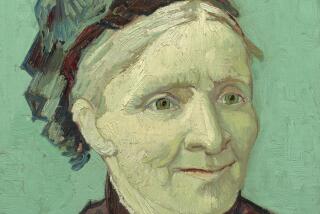PICTURE THIS ON DOWNTOWN’S DOORSTEP
Atop an elaborate 750-foot-tall column designed in sci-fi Gothic style, Australian expatriate Brett-Livingstone Strong wants to erect a statue of a female angel twice as tall as the Statue of Liberty in New York Harbor. Planned as the centerpiece to an 88-acre theme park adjacent to the Harbor Freeway at 3rd and Bixel streets near downtown L.A., the privately funded City of Angels Monument is being billed as a memorial honoring the arts and entertainment.
Like most things about this morbid spectacle, the claim is junk. Any link between this overblown bowling trophy and late 20th century ideas of arts and entertainment is superficial at best.
Strong’s lurid design shows a big-busted babe clad in clingy, thigh-high lingerie and raising a laser-tipped sword overhead. The design’s cheap vision of womanhood--think “Xena, Warrior Princess” with wings--merely looks like the bastard offspring of a one-night stand between an Emmy and an Oscar.
A flying bit of pneumatic cheesecake, it may or may not represent a value lurking at the core of today’s mainstream entertainment business; but if it’s built, the vulgar colossus will forever represent L.A. That, unfortunately, is what’s in it for us.
What’s in it for Strong? Imagine you’re a modern Gustave Eiffel holding the copyright to reproductions of your wrought-iron tower in downtown Paris, or a latter-day Frederic Bartholdi with rights to the Statue of Liberty. According to an Angel City project document, each of these world-famous monuments generates a minimum of $100 million in annual merchandising revenue. Strong knows all about merchandising. His past designs for pop-schlock collectibles have reportedly made him rich.
Through pricey shops in Rodeo Drive-style neighborhoods and on various Web sites, he hawks high-priced “limited-edition prints” and “commemorative coins.” They reproduce, among other things, his authorized portrait of singer Michael Jackson, sentimental paintings of seven “Natural Wonders of the World” and a rendering of something called “The World Friendship Monument,” proposed to be built in Russia from dismantled nuclear weapons.
Knowledgeable print production sources generously estimate that each serigraph in an edition of 300 “Natural Wonders” reproductions might cost Strong $100 or $150 to make; they are priced to sell at $8,000 apiece. That totals $2.4 million for the entire edition--and there are six more “natural wonders” in that set alone.
Still, this astronomical sum is peanuts compared with the possibilities from merchandising the City of Angels Monument. If licensing revenues also start rolling in from souvenirs--Angel City postcards, paperweights, key chains, kitchen thermometers and, who knows, mementos of a “Dick Clark’s New Year’s Rockin’ Eve” television special--even Bill Gates’ accountant will blush.
It’s not illegal to make money. But any claim of artistic significance for the City of Angels Monument is insupportable. This isn’t individual opinion but time-tested consensus.
Angel City documents call Strong a “charismatic artist,” but in the last 20 years he has never been represented by a mainstream American art gallery; his work will not be found in the collections of any major art museums; no sustaining body of critical writing about his art exists in the academic, trade or popular press; no established secondary market exists for his art, either through auction houses or blue-chip galleries, where the possibility of resale is the final judge of art’s monetary value. On all these established and objective scales, Strong’s art rates a zero.
*
Strong’s proposed statue might be hideous, but it derives from a famous ancient source. Common parlance calls it a winged victory, as in the famous Hellenistic “Winged Victory of Samothrace” (circa 190 BC) now resting atop a grand staircase in Paris’ Louvre Museum.
She was known to the Greeks as a Nike, a female military image that evolved first as decoration on painted pots, then as carved statues and reliefs adorning pagan temples. (The exquisite Nike of Samothrace was carved to celebrate a naval victory in far-off Rhodes.) Part Athena, ferocious goddess of war, and part Aphrodite, sensual goddess of love, the Nike represented a powerful, complex psychology of eroticized militarism: Be good in war, boys--then enjoy the girls back home.
Strong’s kitsch-Nike has none of the formal verve and imaginative authority of even the weakest of its remote ancestors. As seen in inert models and flashy renderings in the artist’s studio, the sculpture will be a 350-foot-tall bronze figure contained within a vertical column of enclosed space, which the artist has attempted to enliven through surface application of decorative flourishes. Ignoring as irrelevant the entire history of 20th century sculpture, the design represents arrested artistic development.
This Nike recalls the late Victorian drivel of British academic artists like Frederic, Lord Leighton, in which classical myth was given a candy-colored gloss in order to flatter the high-minded pretensions of the audience the painter meant to woo. Strong is Australian, which may explain the sculpture’s antiquated British flavor--although a loose pastiche of Belle Epoque style has been a favorite American symbol for Klassy Kulchur ever since the rise of the urban bordello. Like Bartholdi and Eiffel, whose monuments were built in 1884 and 1889, Strong is stuck on a 19th century visual vocabulary--albeit for a 21st century monument.
The column’s arched tracery will rise to roughly the height of the 73-story Library Tower across the Harbor Freeway. Strong describes the tracery’s ugly, made-up style as Gothic Futurist, but it’s just more hollow surface decor with none of the structural integrity of authentic 12th century Gothic or 20th century Futurist architecture. The style is merely Goth, a dungeons-and-dragons vision of adolescent spiritual mystery--Batman meets Marilyn Manson.
Even if Strong had the talent to fashion a convincing classical Nike, though, what would be the point? That ancient visual language is long lost to the modern public the sculpture is meant to address. It would be like dubbing television in Latin.
And just because some rich collectibles artist out in Pacific Palisades claims his Nike “honors” the arts and entertainment doesn’t automatically make it so. Meaning is not conferred by artist’s fiat. In L.A., in fact, with its emerging Latino majority, something entirely different is likely to come more immediately to mind.
*
A colossal downtown angel on a column may well generate less than favorable comparisons with the famous angel column on Mexico City’s Paseo Reforma--the “Monument to the Heroes of the Independence.” There, the elegant gilded-bronze angel, completed in 1906 by sculptor Antonio Rivas Mercado and standing 22 feet tall atop a 150-foot marble and granite column, is an actual remnant of the late Victorian Classical Revival style that Strong devolves into cheesy pastiche.
Mexico City’s angel column might not be major art, but it is a sober and distinguished funerary statue that honors those who gave up their lives in the struggle for human liberty. The decline of the classical world and the rise of the Christian one had long ago transformed the ancient Greek Nike: That “winged victory” became Christianity’s angel, winged symbol of victory over death.
Death is the point here. Strong’s artistic training in Australia was as a carver of cemetery headstones. His trophy-monument is also funerary, but absent any noble theme. The morbid colossus instead celebrates a triumph over mortality as some cash-gushing victory in the modern show-business wars.
Strong’s kitsch-Nike would be laughable--if it weren’t pitiful as well. Los Angeles has long been caricatured as a place where developers regularly run amok; as the millennium breaks, we’re about to see just how far over the edge of trashy vulgarity the citizenry will allow them to go.
More to Read
The biggest entertainment stories
Get our big stories about Hollywood, film, television, music, arts, culture and more right in your inbox as soon as they publish.
You may occasionally receive promotional content from the Los Angeles Times.











